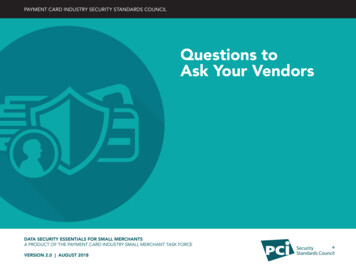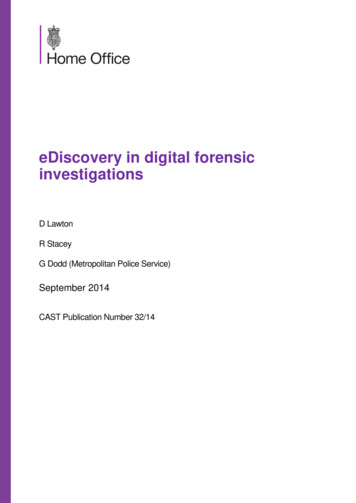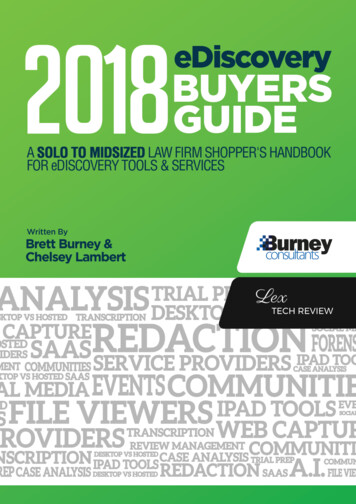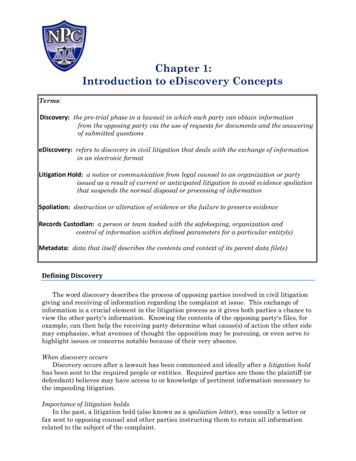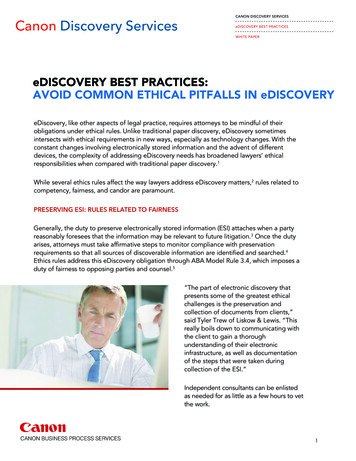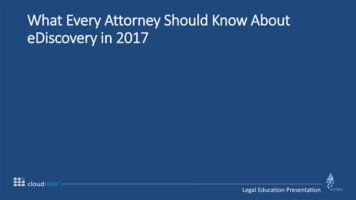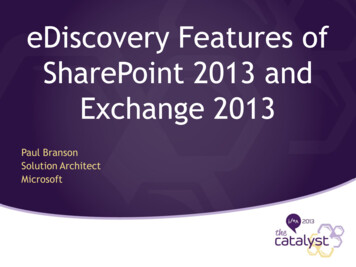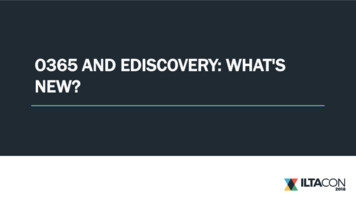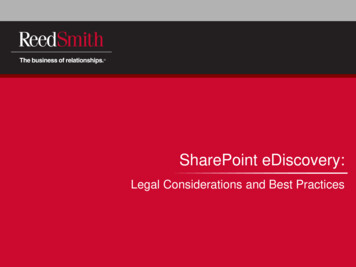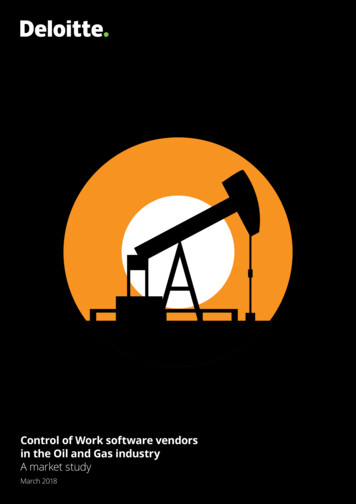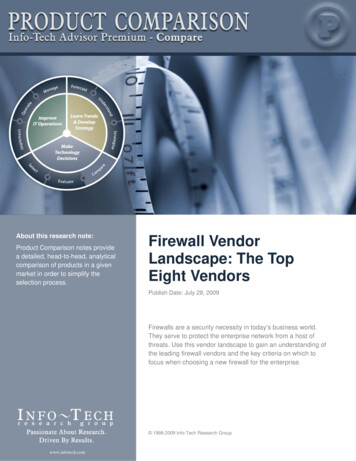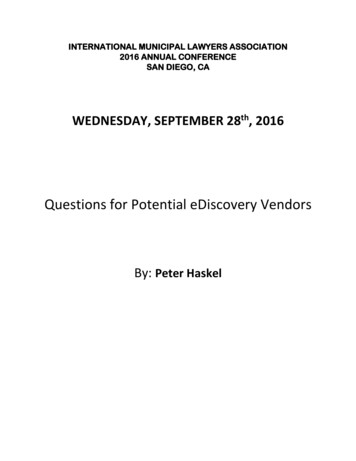
Transcription
INTERNATIONAL MUNICIPAL LAWYERS ASSOCIATION2016 ANNUAL CONFERENCESAN DIEGO, CAWEDNESDAY, SEPTEMBER 28th, 2016Questions for Potential eDiscovery VendorsBy: Peter Haskel
HOW TO SELECT AN eDISCOVERY VENDORBy Pete Haskel, Executive Assistant City Attorney, Dallas, TexasEthical duties in choosing eDiscovery vendorsDue diligence in choosing an eDiscovery vendor is not just a prudent business practice, it is anethical mandate. The ethical requirement stems from at least five separate duties under theABA’s Model Rules of Professional Conduct.1Model Rule 1.1 mandates professional competence including, per Comment [8] to the rule,familiarity with technology developments and associated risks.Model Rule 1.6 requires protection of client confidential information. Model Rule 1.7(a)(2)prohibits representing one client that has any interest directly adverse to another client.Although the conflict can be resolved under certain circumstances by an informed client’s writtenconsent. Rule 1.7(b)(1) – (4). A latent potential for conflict is often overlooked – if the eDiscoveryvendor is a lawyer’s agent and the vendor is working for a party adverse to the lawyer’s client, isthat conflict imputed to the lawyer? I think so at least sometimes, depending on the facts. Mybelief is supported by Model Rule Model Rule 5.3 (addressed below), which makes lawyersresponsible for the conduct of retained non-lawyers who assist them in providing legal service.Therefore, my checklist includes conflicts of interests questions to the potential vendor.Model Rule 1.5 requires care in the safekeeping of client property. Does this rule apply tointangible electronically stored information? I think so. So do the legal ethics committees in the20 whose bars have issued ethics rules for the handling of client information in the cloud.2 I seeno meaningful distinction from a legal ethics perspective in the due diligence required beforeputting client information on cloud servers administered by a vendor and the diligence requiredbefore giving client information to an eDiscovery vendor (who may be using cloud storage foryour client’s data, or not – I do not see that as material). I think some of the cloud ethics rulesare unduly burdensome and of questionable value. But a lawyer could not go far wrong inapplying his or her state’s cloud ethics rules when choosing an eDiscovery vendor.Finally, Model Rule 5.3 makes lawyers responsible for the conduct of any “nonlawyer employedor retained by or associated with a lawyer.” (Emphasis added). I think this responsibility extendsto the selection and supervision of eDiscovery vendors, and imputes their conduct to the lawyer.Does it extend to subcontractors – does the lawyer’s due diligence also extend to questions aboutsubcontractors? The lawyer should be careful not to impose duties or unnecessary limits on thePage 1 of 9
vendor’s selection of subcontractors (except prohibiting their use) to prevent the vendor losingits status as independent contractor.The ChecklistHere are some suggested topics for discussion with vendors when selecting eDiscovery supportservices. The same topics might be incorporated into an RFP or other procurement instrument.eDiscovery in this context includes almost the full range of activities covered by such resourcesas EDRM3, from information management through legal hold, collection, review, production, andpresentation. My focus is on practical questions from a litigator’s perspective that are relevantto the vendor’s competence. I strongly recommend consulting with your technology staff totailor these questions to your own technology architecture and to add specific technologyquestions on topics not covered here. Procuring eDiscovery support services must be a teameffort. Neither the legal nor technology departments should act without the other in this effort.Each department, plus your procurement staff, will need help from the others in theprocurement process.I skip over some very fundamental issues in this list of questions. Before or while interviewingvendors, you may wish to revisit some basic issues: Should we do our own eDiscovery supportwithout outside assistance? Do we need the assistance of a disinterested (not competing foryour support business) outside consultant to help us interview the competing vendors? Is theoccasion for eDiscovery support procurement a good time to review all software that we use forlitigation (such as stand-alone applications for courtroom presentation, video recording, accidentrecreation, or internal document review)?Basics1. Alternative sources for the services? Can you, and if so should you, procure your eDiscoverysupport services through a federal, state or local government-consortium procurementprocess that may already have done much of your due diligence and negotiated good pricing?You should have investigated this possibility before your conversations with vendors, but askthem too – they may participate in programs for which you are eligible but that you mightnot have discovered.2. Range of supported activities within EDRM eDiscovery model? Is the vendor offering abundled all-in-one package or can buyer select among modules (e.g., get collection andreview modules but defer procuring legal hold module)? Are there some important functionsPage 2 of 9
that you need but that the vendor does not provide (e.g., annotation of transcripts,associating transcript excerpts with exhibits, or perhaps courtroom presentation).3. Protecting confidentiality.a. Does the contract obligate vendor to protect your client’s confidential informationand to impose that duty on all employees and subcontractors?b. Does contract obligate vendor to notify you immediately of any breach?c. What actual protections for confidentiality does the vendor use? Encryption?Firewalls? Anti-malware software? Other?d. What training and qualifications do employees have as to confidentialityprotection?4. Will vendor negotiate modifications of its form contracts? If not, can you lawfully contractwith the vendor--and even if you can, do you want to?5. Basic platform information:a. Cloud or Hardware?b. Where will data reside? What laws will apply to data access depending on locationand your contract(s)?c. Can you get all data back and ensure destruction of any copies, duplicates, orimages by whatever name?6. Service level agreements:a. What level of downtime or error percentage at each EFRM stage will constitute abreach of contract giving the lawyer remedies such as liquidated damages, specificperformance at no additional costs, free expert testimony, etc.?7. Compatibility with other software, cloud service, and hardware (including mobile devices)for each EDRM stage (each eDiscovery activity):a. Compatible with other software or cloud services that you already use or areconsidering (i.e., can and should you try to mix and match from different vendors);b. Compatible with other software, service & hardware that you are consideringprocuring.c. Beware of compatibility claims. They often assume cumbersome and unstableworkarounds. Test for true compatibility before buying.d. Will the compatibility remain when vendors upgrade their products? The upgrademight be by the eDiscovery vendor being considered or the provider of anotherPage 3 of 9
service for which you want to ensure continued compatibility with the newvendor’s product.8. Expert testimony: Will vendor at no additional charge (or at negotiated charge) provideexpert affidavits and live testimony to explain their product & services and defend theirmethodology for discovery disputes, evidentiary arguments, and to convince jury that theirresults are credible.a. Make the vendor explain is identification, collection, storage, processing, review,production, and presentation processes to you in plain English to test whether aresatisfied that it can effectively defend its processes.b. If the vendor will not do this for no charge, and you still want to use this vendor,negotiate witness rates and terms to include in the contract, or in a separatecontract with an expert consultant that the vendor recommends and has certifiedfor competence for the product you are considering.9. The vendor’s experience, track record and expertise:a. How long has the company been working with eDiscovery?b. Relevant experiencei. Local government clients?ii. Other government clients?iii. Law firms? (Use this topic both to obtain references and to explorepotential conflicts. Do you want to risk using the same vendor used by afrequent opposing counsel? If so, what “Ethics Wall” arrangements can beimplemented?)iv. Does the vendor do work for a party adverse to the City in a pending case?This might be a deal-breaker unless the exceptions under Model Rule1.7(b)(1) – (4) can be satisfied.c. Specific functions for other clients? (Was their role limited to specific projects orfunctions? Were they consultants or did they or their product do the work)?d. Cases in your locality?e. Cases before a specific judge or of a specific case type or subject-matter?f. On what major cases has the vendor previously worked & how recently? Whatwas their role in each case?g. Vendor’s experience with discovery, production, or presentation softwarecommonly used not only by you, but by your frequent opposing counsel and bythe local courts. Familiarity with the software used by opponents and the courtswill important for being able to process incoming discovery production and forputting on a case.h. Vendor’s level of understanding of the litigation and eDiscovery process?Page 4 of 9
i.Vendor’s familiarity with any rules, protocols or procedures unique to localgovernment or local courts?j. Do the vendor’s employees have relevant certification or accreditation (you willneed input from your technology staff to ask the right questions and to interpretthe answers).k. Does the vendor have legal professionals on staff or retained, and will that staffinglevel and quality be substantially maintained?10. The scope of the vendor’s services:a. What services does the vendor offer? Do these services meet your particularneeds in this case?b. What services, if any, does the vendor subcontract out to third parties?c. Who is the third party, and what are its credentials?d. Does data ever leave the vendor’s site or system? Where are vendor’s serverslocated? Is there redundancy?e. How will the vendor price the project? Is the vendor’s pricing structureappropriate for the particular needs of your case? Is the pricing structurecompetitive? (Pricing is further discussed below)f. If the scope of the case, the resources devoted by the lawyer to eDiscovery suchas the number of “seats” using the product, or the scope of vendor work increases,can the vendor’s product be scaled up efficiently and effectively? How will theadded services affect pricing?g. Will there be sufficient storage capacity for your project at the quoted price?What are prices for additional capacity if needed?h. Can the vendor’s products also be used for responding to open records requestsin compliance with state law?i. Can your work product and vendor’s data be exported to different platforms ifnecessary? Production to adverse parties? Your decision to use different reviewplatform? Archiving at close of case?j. At the end of each project and at the end of the contract, will the lawyer get ALLof its data back in usable form (a definite obligation, data format(s), inclusion ofall annotations and other input by client, and timing).k. Any vestige of client data left on vendor’s system should be wiped, includingmetadata, backups, etc.11. Technical support:a. Is the vendor using proprietary or off-the-shelf processing and review tools? Ifproprietary, what is the age of the product, and has it been reviewed? If off-theshelf is there a risk that the vendor will not be able to or will decide not to renewPage 5 of 9
b.c.d.e.its license for the product? If off the shelf will the maker or seller provide technicalsupport at no charge? Is there any EULA or manufacturer’s warranty running tothe retail buyer? Is the buyer obligated by the EULA to defend the maker fromintellectual property challenges or other claims?Does the vendor provide the technical assistance that you require in your specificcase? (For example, does the vendor offer de-duplication, the generation of loadfiles, smart searching, predictive coding or computer-assisted review, etc.?)What is the database and document review infrastructure?What software will the document review team require in order to search, reviewand manipulate the data?Does the vendor have experience with any unique or uncommon types of ESI thatmay be applicable in your present case (e.g., architectural rendering software files,construction schedule support files, accounting and time-keeping program files,medical or other specialized computer programs software files)?12. The vendor’s customer service:a. How are the cases managed and staffed?b. Can the vendor accommodate the level of work intensity that you require? Do youexpect your team to be working 24/7, and, if so, can the vendor support that levelof work intensity?c. How much lead time, if any, is required for collection, processing and productionwork?d. How available are the vendor representatives during off-hours?e. Is technical support free or, if not, are clear terms for technical support put intothe contract.f. Will the vendor provide training? Will the trainer be experienced and qualified?Will the manufacturer provide training for an off-the-shelf product? At whatprices? Scope of training? Online tutorials and other training resources? For howlong will training be provided (refresher training; training to use any upgrades ornew versions; training for new attorneys and support staff during the term of thecontract)?g. Will there be a primary point of contact person?13. The vendor’s quality of services:a. How does the vendor ensure speed and efficient performance? (see section onservice level agreements below)b. Does the vendor track mistakes and errors for future improvement?c. Is the vendor a thought leader in the industry? Participation in EDRM, seminars,CLE programs, etc.Page 6 of 9
d. Is the vendor respected among other similar vendors?e. Has the vendor ever been sued by customer? If so, details.f. Has the vendor any of its customers been sanctioned for discovery abuse & if soto what extent might it have been the vendor’ fault?14. Pricing:a. What are the costs for installation, testing, training, and related start-up costs?Pry for hidden charges & ensure all you need is within the start-up price.b. What hardware or software or SaaS services is the lawyer supposed to procure forcompatibility?c. Price terms, conditions, and structure after initial installation and testing. Perseat? Based on data volume? Other pricing basis? Will lawyer have to pay foradditional data storage capacity as volume grows?d. Guaranteed pricing or future limits on price increases.e. Pricing on future upgrades and versions – try to lock in.f. Separate pricing for each module within a bundle?Resources for Questions to Ask Potential VendorsMatthew I. Cohen, et al., Navigating the Vendor Proposal Process: Best Practices for the Selectionof Electronic Discovery Vendors (June 2007) The Sedona Conference (WG1 Working /Best Practices for the Selection of Electronic Discovery Vendors (last accessed Feb. 5, 2015) [pdf download free with registration].eDiscovery Vendor Viability: Considerations Beyond Technology and Talent ond-technology-and-talent/ (last visited Feb. 6, 2015).Gregory L. Fordham, Selecting an E-Discovery Vendor A Best Value Approach - e-discovery,computer forensics, damages quantification - Fordham Forensics, Atlanta Georgia (Updated Sept.2014), ting-ediscovery-vendor.html (lastvisited Feb. 6, 2015).Daniel B. Garrie, Top Ten Tips for Managing e-Discovery Vendors, ThompsonReuters (Apr. 3,2013), ten/tttfmev.cfm (last visited Feb. 6,2015).Page 7 of 9
Maura R. Grossman, et al., The Sedona Conference Commentary on Defense of Process PublicComment Version September 2016, https://thesedonaconference.org/download-pub/4815 (lastaccessed Sept.11,2016) [pdf download free with registration].David Houlihan, Key Questions When Selecting E-Discovery Vendors - Law360 (Jan. 29, estions-when-selecting-e-discovery-vendors(last visited Feb. 6, 2015). (subscription required unless it is in your WL package).Judah Lifschitz, George Carry, Technology: 5 considerations when choosing an e-discoveryvendor, Inside Counsel (July 6, 2012), 5-considerations-when-choosing-an-e-dis (last visited Sept. 12, 2016).Andreas Mueller, Selecting eDiscovery Vendors Modus eDiscovery (three parts): Part 1:Selecting an eDiscovery Vendor is like Buying the Right Car – But Don’t Forget about theDealership (Sept. 17, 2014), lectionmethodology/ (last visited Feb. 17, 2015); Part 2: Learning What You Want to Know (Oct. 13,2014), lection-2-rfi-rfp/ (last visited Feb.17, 2015); Part 3: Making Your Choice (Nov. 10, dor-selection-part-3-making-your-choice/ (lastvisited Sept 21, 2016).Mark Yacano, Vetting Your E-Discovery Vendor: The Lawyer's Perspective, ABA Law PracticeToday (Mar. 2004 article date, Nov. 2005 publication /ftr07043.html (last visited Feb. 6, 2015).Request for Proposal Forms.(Caution: Some of the following were drafted, or at least customized, by vendors):Alabama Attorney General, RFP-eDiscovery Solutions - 027-201401 - File-RFP-eDiscoverySolutions-027-201401, utions-027-201401(last visited Apr. 22, 2015).Clearwell, Microsoft Word - Sample E-Discovery rs/clearwell/Sample E-Discovery RFP.pdf (lastaccessed Feb. 17, 2015).Page 8 of 9
City of Kirkland WA (April 30, 2012),http://www.kirklandwa.gov/Assets/RFP for Electronic Discovery Services %28PDF%29.pdf(last accessed Feb. 17, 2015).City of Seattle WA RFI (not RFP) (Aug. 23, 387.doc (last accessed Feb. 17, 2015).City of Memphis TN RFP (Sept. 9, 2014),http://www.memphistn.gov/Portals/0/pdf forms/eDiscovery%20Solution%20RFP%20%20Final.pdf (last accessed Feb. 17, onal responsibility/publications/model rules of professional conduct/model rules of professional conduct table of contents.html (as of Sept. 11, 2016).2Annotated links to these Rules are on the ABA Web site athttps://www.americanbar.org/groups/departments offices/legal technology resources/resources/charts fyis/cloud-ethics-chart.html (as of Sept. 11, 2016). However, the ABA has been dilatory in keeping up with new ethicsdevelopments on some of its online charts, to there may be additional states not listed on this Web site.3EDRM is the eDiscovery Research Model organization, now acquired by Duke Law School. See .edrm.net for moreinformation about the organization, its thoughtful and though-provoking work-flow models, and a rich trove ofother eDiscovery resources.Page 9 of 9
tailor these questions to your own technology architecture and to add specific technology questions on topics not covered here. Procuring eDiscovery support services must be a team effort. Neither the legal nor technology
